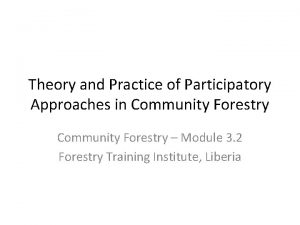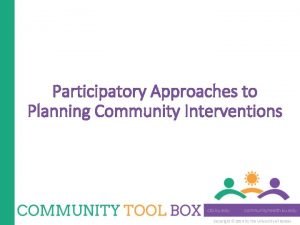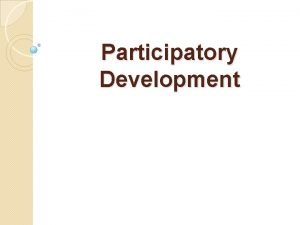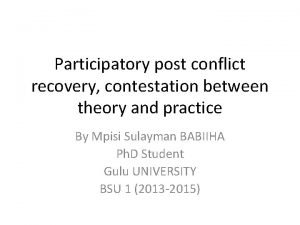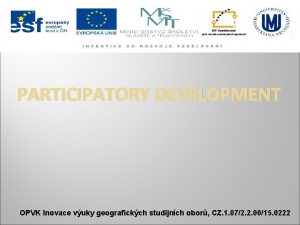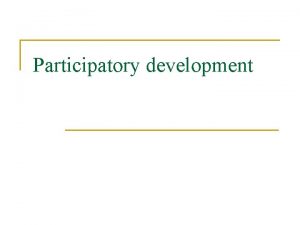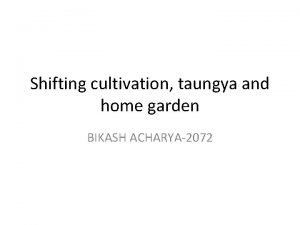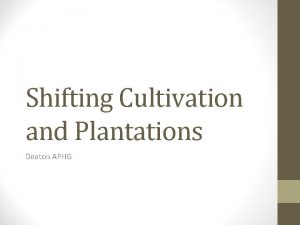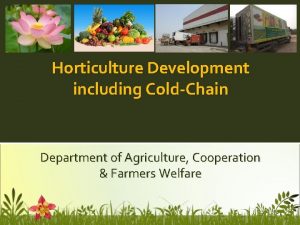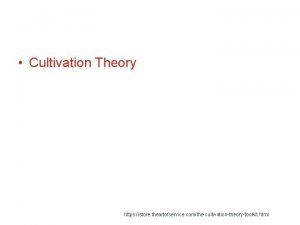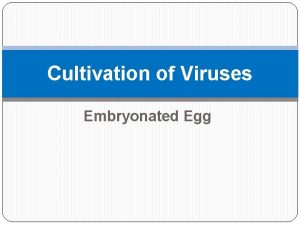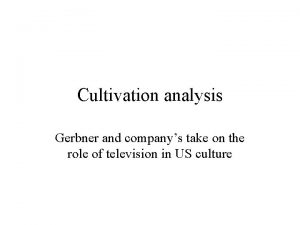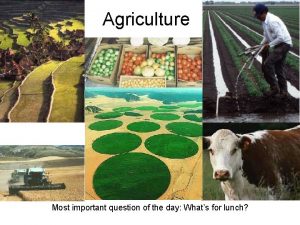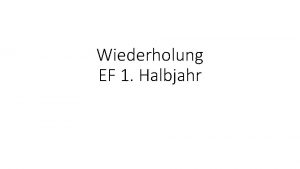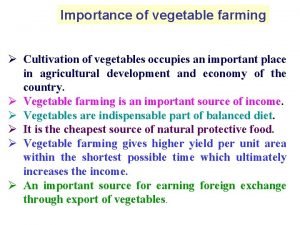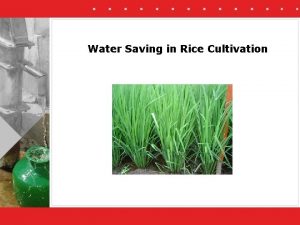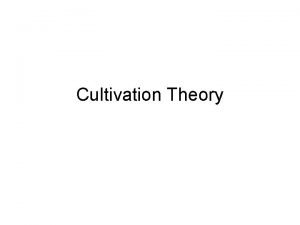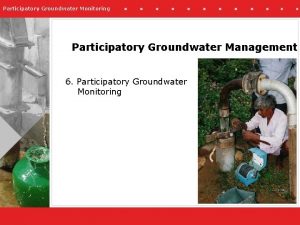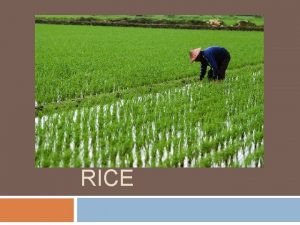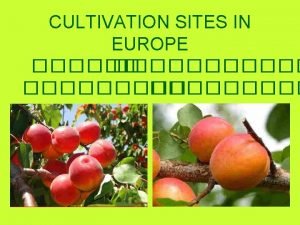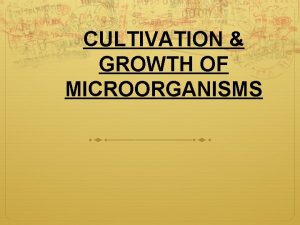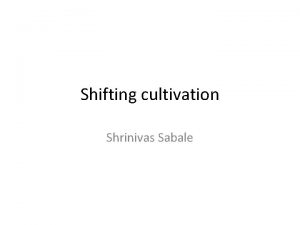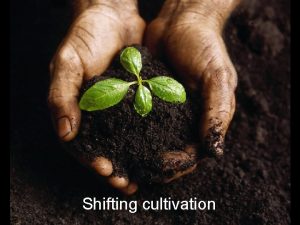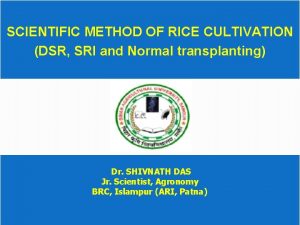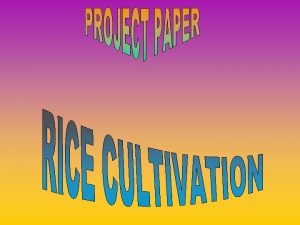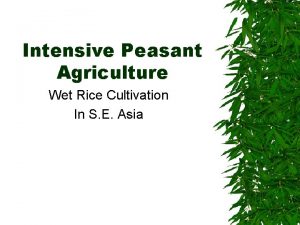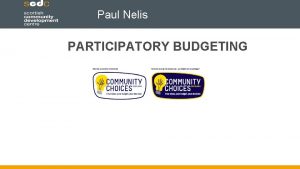A lowcost participatory development approach for rice cultivation





















- Slides: 21

A low-cost participatory development approach for rice cultivation in inland valleys Sander Zwart, Worou Soklou Africa Rice Center (Cotonou) Felix Gbaguidi Cellule Bas-Fond (Porto Novo) Assimiou Adou Rahim Alimi Institut Togolais de Recherche Agronomique (Lomé)

This presentation will show an alternative to ‘traditional’ investment projects for agricultural development of inland valleys This method is baptized as “Smart-valleys”

‘Traditional’ investments project develop: - Concrete structures including canals, weirs, divers, etc. - Stone dams Bottlenecks - Short project period - Slow process (tenders) - Low quality of works - No ownership = no maintenance

Requirements for sustainable implementation: - Strong farmers organization - Continued support (from extension agencies) - Land tenure arrangements - Access to credits and markets

Smart-valleys development approach • • Simple Participatory Low-cost Easy to replicate 5 steps approach in which farmers are participating

1. Sensitization of farmers 2. Land clearing 3. Design of the system 4. System implementation 5. Rice cultivation

WUR – Africa. Rice workshop Cotonou, Benin, February 1, 2013

SMART-IV project: Countries: Benin and Togo Partners: ITRA (Togo), Cellule Bas-fonds (Benin) Environ. : inland valley rice production Time: 2009 -2014 Donor: Ministry of Agriculture (MAFF) in Japan Target: Establish demonstration sites Facilitate adoption Assess impact Development of agricultural practices

2011 – development and demonstration sites Kara Parakou Notsé Glazoué Ouinhi Kpalimé

2012 – development and demonstration sites Kara Parakou Notsé Glazoué Ouinhi Kpalimé

2013 – development and demonstration sites Kara Parakou Notsé Glazoué Ouinhi Kpalimé

2013 – development and demonstration sites Kara Parakou Notsé Glazoué GRED farmers Kpalimé Ouinhi farmers

Togo Benin + other NGO’s Providing training Developing sites Coordinate development activities Implement new projects with Smart-valley approach Providing training Technical backstopping Support fundraising

Building capacity Development of training set (end of 2014): Instruction guide + Field guide + Educational video Providing training to: - Rice farmers (site development) - Field technicians of extension services and NGO’s (guiding farmers in development) - Leader farmers (guiding other farmers) - Trainers (training of new trainers)

Demonstration sites developed, but now…. 1. Long-term support and capacity building to farmers, extension staff and NGOs 2. Slow, step-by-step introduction of new agricultural practices and tools to farmers (participatory evaluation) 3. Strengthening farmer organization and linking them to the rice value chain (Multi-Stakeholder Platforms)

The way forward 1. Long-term support and capacity building to farmers, extension staff and NGOs • Training package and discussion video being developed • Trainings organized for field technicians, on the approach, but also sustainable introduction of field machinery (powertillers, mechanic weeders)

The way forward 2. Slow, step-by-step introduction of new agricultural practices and tools to farmers (participatory evaluation) • Extension officer and field technicians are being trained in good agricultural practices • Farmers in demonstration sites are exposed to GAP • Farmers in demonstration sites participate in evaluation of mechanic weeders & powertillers

The way forward Participatory evaluation of mechanic weeders (Atsuko, 2013)

The way forward 3. Strengthening farmer organization and linking them to the rice value chain Multi-Stakeholder Platforms to link producers to input dealers, rice buyers/millers, banks, extension services

Foire de la connaissance des technologies rizicoles d’Africa. Rice Septembre 1 -2, Abomey-Calavi Smart-Valleys – une approche de développement participative et peu coûteuse Atlas des bas-fonds – évaluation du potentiel de développement Rice. Advice – conseil localisé au producteur en matière de gestion des éléments nutritifs Plateformes multi acteurs – amélioration de l’accès des producteurs à la chaîne de valeur Motoculteurs – adaptation locale pour supporter les utilisations multiples ARICA – nouvelles lignées de variétés de riz Désherbeuses mécaniques – réduire la main-d’œuvre dans la production rizicole Étuveuses USD – qualité améliorée et énergétique Batteuse ASI – batteuse de grande capacité pour du riz propre APRA – l’apprentissage participatif et recherche action pour améliorer

 Intensive rice cultivation
Intensive rice cultivation Participatory approach in development communication
Participatory approach in development communication Advantage of participatory planning approach
Advantage of participatory planning approach Disadvantages of participatory planning approach
Disadvantages of participatory planning approach What is participatory development
What is participatory development What is participatory development
What is participatory development What is participatory development
What is participatory development Participatory development
Participatory development Participatory development
Participatory development Participatory technology development
Participatory technology development Shifting cultivation and taungya system
Shifting cultivation and taungya system Shifting cultivation aphg
Shifting cultivation aphg Scope of protected cultivation
Scope of protected cultivation Cultivation analysis
Cultivation analysis Cultivation of viruses
Cultivation of viruses Virus cultivation in embryonated eggs
Virus cultivation in embryonated eggs Cultivation analysis
Cultivation analysis Message system analysis
Message system analysis Magna carta for teachers
Magna carta for teachers Whats shifting cultivation
Whats shifting cultivation Thermoisoplethendiagramm tropen
Thermoisoplethendiagramm tropen Importance of vegetable farming
Importance of vegetable farming


